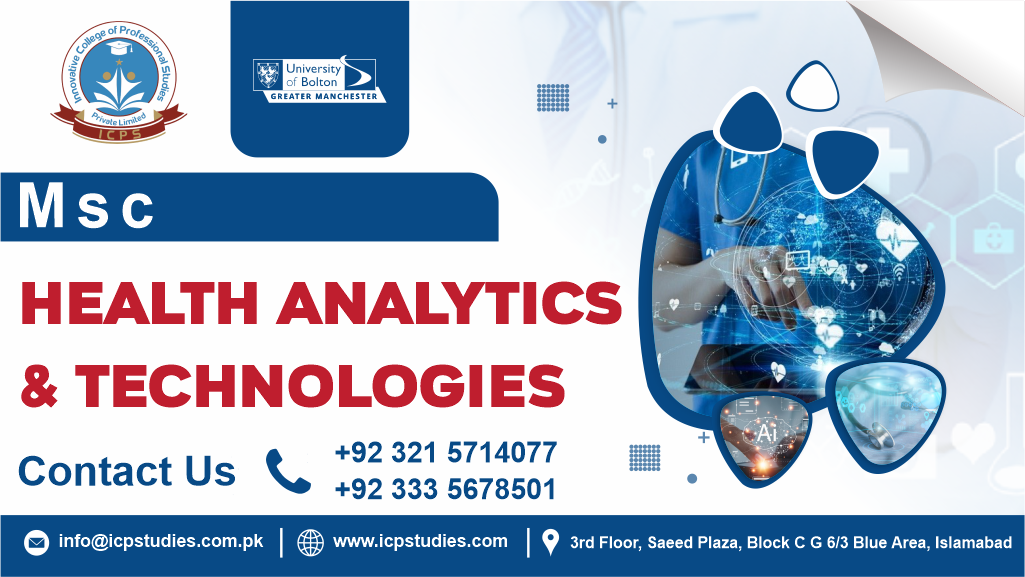Course Overview
Health data is rapidly becoming a driving force in the global economy, with the health analytics market valued at over $43 billion in 2023 and projected to grow by more than 20% between 2024 and 2030. Healthcare providers are striving to optimize processes and enhance patient experiences, while governments require accurate public health predictions to save lives. Meanwhile, medical research organizations are utilizing digital technologies to drive innovation. These advancements rely on skilled professionals who can process and analyze healthcare data to identify trends, patterns, and root causes. By enrolling in the University of Bolton’s MSc in Health Analytics and Technologies, you will gain crucial expertise in data analysis and the technological principles that support these practices, all while enjoying a student-focused, multicultural campus environment.
A unique aspect of this program is the development of essential skills in computer programming and data analytics, with no prior experience required. You will acquire the tools necessary to analyze and interpret data, uncover valuable insights, and effectively communicate your findings. This will empower you to transform healthcare data into actionable insights that drive informed decision-making in the health sector. Our experienced faculty will guide you through essential topics in computing, data analytics, business, marketing, and key life skills such as leadership, advanced analysis, and creative problem-solving. We prioritize helping you develop the communication skills necessary to present your insights clearly, whether visually, in writing, or verbally.
Each module in the program explores current industry issues, strategies, and practices, using live case studies, guest speakers from the field, and cutting-edge research. You will have the opportunity to select from specialized optional modules and work with faculty on a personalized capstone project tailored to your specific interests and professional goals.
Our curriculum focuses on equipping you with the industry-relevant knowledge and skills needed to excel in healthcare data analytics and technology roles. Additionally, we emphasize the importance of lifelong learning, empowering you to take control of your career development and maximize your future success.
Highlights
- Bolton University’s MSc in Health Analytics and Technologies emphasizes collaboration with industry partners and offers a robust curriculum covering essential topics in the field.
- We continually update our programs to ensure they align with industry standards, providing the best preparation for your career.
- Practical research projects and coursework will enable you to engage with real-world scenarios, enhancing your understanding of the technical concepts in health analytics and technologies.
- Your dissertation will allow you to deepen your subject knowledge and demonstrate your expertise to potential employers.
Key Features
- Teaching is delivered by experienced faculty with expertise in health informatics, big data, relevant technologies, and professional development.
- Engaging masterclasses and guest speaker sessions from industry professionals will provide valuable insights into contemporary developments in health data analysis and digital technologies.
- Industry partners contribute up-to-date input to our teaching and student projects, ensuring a real-world learning experience.
- Face-to-face sessions and personalized support from our knowledgeable lecturers will ensure you receive the guidance you need throughout your studies.
- Your Professional Dissertation will showcase your research and critical thinking abilities, highlighting your skills in health analytics and technologies to prospective employers.
Upon graduation, you’ll be prepared to make an immediate impact in the field of health data analytics and technologies. Bolton’s location offers the perfect blend of cultural and outdoor experiences, with Manchester just a short train ride away and the scenic beauty of the North West countryside nearby. This makes Bolton an ideal base for exploring both professional opportunities and the best that the UK has to offer.
Entry Requirements
To be considered for this program, you should have a minimum of a lower second class (2.2) honours degree (or equivalent) in any subject, or alternatively, five years of relevant work experience. Prior experience in computer programming or data analytics is not required.
You must also have GCSE Mathematics at grade C (or grade 4-9) or above. If you do not meet this requirement, you will need to complete a diagnostic mathematics test and achieve a minimum score. For further information on other acceptable qualifications, please contact us.
If applying based on work experience, you will need to attend an online or in-person interview and present a portfolio showcasing your relevant work. The portfolio should demonstrate your suitability for the course through examples of your professional achievements, and it must be attested by an independent person, such as a senior employer or a current or former lecturer.
We welcome applications where relevant work experience can be used to supplement or replace formal academic qualifications, in accordance with the University’s Recognition of Prior Experiential Learning (RPEL) procedures. The University seeks candidates who exhibit a strong professional commitment and a clear focus on their career development, and who will benefit from this advanced area of study.
Career Opportunities
Data is revolutionizing industries across the globe, and healthcare is no exception. Organizations such as the NHS, government bodies, private healthcare providers, and biotechnology companies are actively seeking professionals to help interpret and utilize this data. The demand for experts in health analytics and technologies is on the rise, and there is a need for skilled, creative professionals across the healthcare sector.
The MSc in Health Analytics and Technologies offers a direct path into this dynamic and growing field. It is an excellent bridge into health data analysis and technology, regardless of your undergraduate background. This program is also an ideal option if you have relevant work experience and have acquired degree-level knowledge through self-study or hands-on practice, rather than formal education.
As a graduate of this master’s program, you will have a comprehensive theoretical and practical understanding of health analytics and technologies. You will be equipped with essential interpersonal skills such as teamwork and collaboration, along with commercial awareness and healthcare business knowledge. Additionally, you will develop advanced research, critical thinking, and problem-solving skills, preparing you to face new challenges throughout your career.
What can I do with this qualification?
Upon completion of the MSc, you will be well-prepared for a wide range of career opportunities in health analytics and technologies. Whether you pursue a career in the healthcare sector or further study, such as a PhD, this qualification opens doors to diverse roles in the industry.
Health data analysts are in high demand, and the scope of health analytics roles is vast. Big data has increased the need for professionals who can create data visualizations, dashboards, and reports to communicate insights effectively. You might find yourself analyzing trends and patterns to help healthcare providers make data-driven decisions or predict service demands. Alternatively, you could work in the pharmaceutical, biotechnology, or medical research sectors, analyzing large datasets to draw conclusions and provide actionable insights to support business development. Government organizations and national institutes also require data scientists to explore population health, as well as the relationships between genetics, environment, and disease.
Alternative Career Options
Depending on your previous qualifications and experience, this master’s degree can also serve as a stepping-stone into various other careers. Some of these roles may require additional experience or further postgraduate study. Potential career paths include:
- Leadership and management
- Technology integration to improve business and industrial processes
- Solutions-driven business and industrial analysis
- Marketing and public relations
- Social media management
- Information systems management
- Cybersecurity
- Social enterprise
- Policy management
- Education and teaching
- Advising and consultancy
This MSc provides a solid foundation for those interested in shaping the future of healthcare through data and technology, while also offering flexibility for broader career possibilities.
Modules
The following modules are available as part of the course and may include a combination of compulsory and optional units. Please note that not all modules may be available for study during your course.
- Professional Practice
- Research Methods
- Project
- Programming for Data Analytics
- Digital Transformation in Health
- Health Informatics
- Data Analysis and Visualisation
- Data Mining and Machine Learning







